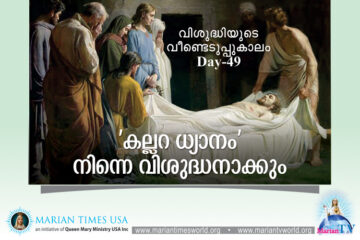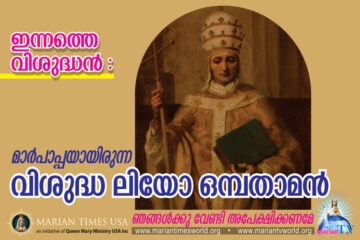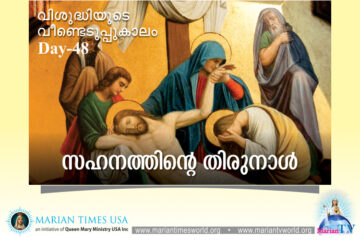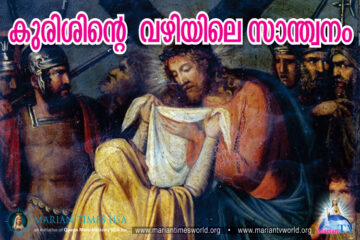Do you have the courage to proclaim Jesus? (Sunday Homily)

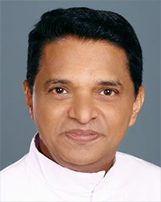
~ Fr. Abraham Mutholath ~
Chicago, USA. ~
HOMILY FIRST SUNDAY OF THE DEDICATION OF THE CHURCH
INTRODUCTION
Jesus took his disciples to Caesarea Philippi, a place of pagan worship and the popularly believed entrance to Hades and asked them to share the feedback of the people on Jesus. After assessing that no one properly understood who he was, Jesus asked for the understanding of the disciples. Peter, revealed by the Father, confessed his faith in Jesus as the son of the living God. Jesus blessed Peter, changed his name from Simon to Peter (rock), declared that he will build his church on the strong foundation of Peter’s faith and entrusted to him the keys of the kingdom of heaven. We must oblige to the authority of the successors of Peter and the other apostles who also received similar authority to lead us into the heavenly kingdom.
THE BIBLE TEXT
Matthew 16:13-19
Peter’s Confession About Jesus.
(13) When Jesus went into the region of Caesarea Philippi, he asked his disciples, “Who do people say that the Son of Man is?” (14) They replied, “Some say John the Baptist, others Elijah, still others Jeremiah or one of the prophets.” (15) He said to them, “But who do you say that I am?” (16) Simon Peter said in reply, “You are the Messiah, the Son of the living God.” (17) Jesus said to him in reply, “Blessed are you, Simon son of Jonah. For flesh and blood has not revealed this to you, but my heavenly Father. (18) And so I say to you, you are Peter, and upon this rock I will build my church, and the gates of the netherworld shall not prevail against it. (19) I will give you the keys to the kingdom of heaven. Whatever you bind on earth shall be bound in heaven; and whatever you loose on earth shall be loosed in heaven.”
INTERPRETATION
(13) When Jesus went into the region of Caesarea Philippi he asked his disciples, “Who do people say that the Son of Man is?”
Caesarea Philippi was an ancient town located at the foot of Mount Hermon (Deut. 3:8) on its southern slope, about 1150 feet above sea level andtwenty-fivemiles north of the Sea of Galilee. It is the northmost border of Palestine at the border of present Lebanon and Syria and near the ancient city of Dan. A spring from a “bottomless pit” that is a main source of Jordan river flows from a cave of the mountain here. This cave was believed to be the entrance to Hades, the Greek underworld where god Pan lived. The area was fertile because of the spring water. The town was dedicated to god Pan in Greek mythology and was known as Paneas (Banias in Arabic). Pan looked like a man with goat’s legs, a tail, and sometimes horns. The ancient Canaanites built a sanctuary for Baal here. After the death of King Solomon, when Israel was divided, King Jeroboam I, the first king of the Northern Israel offered sacrifices to a golden calf in Dan that was only four miles west fromPaneas and thusled the people into idolatry (1 Kings 12:26-29).The Greeks and Romans also built sanctuaries at the mysterious cave of Pan. King Herod the Great had built a magnificent white marble temple in front of the cave honoringEmperor Augustus in gratitude for giving him power over Paneas in 20 BC.
Philip, a son of Herod the Great, was the tetrarch from 4 B.C. until his death in A.D. 34. He rebuilt the town of Paneas as his capital city, naming it Caesarea in honor of the then Roman EmperorTiberiusCaesar. The name Caesarea Philippi (of Philip) was used to distinguish it from his father’s Caesareaatthe seaport in Samariacalled Caesarea Maritime on the coast of the Mediterranean in the Sharon plain.
Why Jesus went toCaesarea Philippi?
Jesus took his disciples to the city of Paneasnot to preach, but to be away from the crowd and his opponents so that he could take rest and prepare before his final journey to Jerusalem for his sacrifice. Jesus purposefully chose this place of pagan worship to reveal his divinity to the disciples because Paneas was believed to be the entrance to Hades. At the Gates of Hades, Jesus proclaimed addressing Peter: “upon this rock I will build my church, and the gates of the netherworld shall not prevail against it.” (Matthew 16:18). Thus Jesus expressed his sovereignty over the evil and the hell at the sinful town of pagan worship and at the popularly believed gate of the netherworld.
Who do people say?
Jesus had almost completed his ministry in Galilee and was going to be crucified. He wanted the disciples evaluate on the impact of his ministry among the people and on themselves. He was not expecting a perfect understanding from the public. However, he wanted to assure that his disciples did understand him.
The Son of Man
When Jesus asked the disciples on the public opinion of him, he implied the answer in the question.The Hebrew phrase “the Son of Man” means a human being (Ezekiel 2:1). However, when the same phrase was used in the vision of Prophet Daniel (7:13), it acquired divine qualities because the son of man came with the clouds of heaven. Ordinary humans cannot travel on the clouds. Jesus chose this phrase for himself out of his humility while others used “Son of God” that gives emphasis to the divine origin of Jesus. So, both Son of man and Son of Godmean the human and divine nature of Jesus.
So, while asking for the views of the people on Jesus, he presented to the disciples who he really was. He was the Son of man, the incarnate Word of God born as the son of a woman without any marital relation (Matthew 1:18).
(14) They replied, “Some say John the Baptist, others Elijah, still others Jeremiah or one of the prophets.”
The Pharisees, who believed in the life after death, had a teaching on transmigration, though not reincarnation. They taught that the spirit of an ancient man of God will reemerge to continue their work at a great national crisis of Israel. Thus, many Jewish scholars had believed that the souls of Adam, Abraham, and other holy men had animated the great men of their nation at special occasions. So, many people who encountered Jesus believed that the spirit of one of such holy persons of Israel have returned to the earth in the body of Jesus. That was the reason, according to them, that Jesus could perform miracles and teach with extraordinary vigor.
John the Baptist
The first comparison of some people, who were familiar with John the Baptist before his martyrdom, was a similarity of John in Jesus. Some say, John and Jesus had facial similarity because they were cousins and were only six months in age difference. More than that, their message was similar because both preached for repentance in preparation for the Kingdom of God. Both baptized people at River Jordan and both had disciples. Some disciples of John continued as disciples of Jesus. Bothcriticized the religious leadersof the time and got opposition from them. Their lives were in danger. Unlike Jesus, John did not perform any miracle and lived a Nasserite lifestyle. However, their resemblance was so close that Herod Antipas, the tetrarch who beheaded John said of Jesus to his servants, “This man is John the Baptist. He has been raised from the dead; that is why mighty powers are at work in him.” (Matthew 14:2). This also shows the popular belief of the time that transmigration of holy souls could happen on the living to continue their mission.
Elijah
Jesus resembled Elijah in raising the son of a widow in Zarephath (1King 17:17-24). Jesus performed more raising from the death than Elijah. Jesus raised daughter of Jairus (Mark 5:22-43), a widow’s son in the town of Nain (Luke 7:11-15), and Lazarus (John 11:1-44). Elijah multiplied ajar of flour and a jug of oil belonging to the widow in Zarephath for a long time so that the prophet, the widow and her household had enough to eat until the draught was over(1 Kings 17:7-16). Jesus multiplied loaves of bread twice to feed big multitude of people who came to listen to him. So, people considered Jesus as a miracle worker like Elijah.
Unlike Jesus, Elijahwas taken up to heaven without facing death. Malachi had prophesied that Elijah would reappear as a forerunner of the Messiah. “Now I am sending to youElijah the prophet, before the day of the LORD comes,the great and terrible day.” (Malachi 3:23 / 4:5). Jews have been expecting the reappearance of Elijah and that is still a part of the Passover ritual of the Jews. Though John the Baptist came according to this prophesy, some still believed that Jesus was the forerunner for the Messiah to come because Jesus resembled some of the actions of Elijah.
Jeremiah
Jeremiah, one of four Major Prophets, along with Isaiah, Ezekiel, and Danielhas been considered as a type of Jesus. The situation of Israel or Jews during the ministry of both Jeremiah and Jesus were similar and so their preaching and actions also had some resemblance. The following are some of the similarities of Jeremiah and Jesus:
Both did not marry, and they were rejected by the people of their hometowns.
Jeremiah and Jesus were forcibly taken to Egypt because of political persecution of the time.
False prophets and religious leaders were misguiding God’s chosen people. So, both Jeremiah and Jesus spoke against them and thus became their enemies. Both were arrested and persecuted for that reason.
Jeremiah was known as the weeping prophet. Jesus also wept at least three times: At the tomb of Lazarus (John 11:35), while prophesying the destruction of the Temple of Jerusalem (Luke 19:41) and at the Garden of Gethsemane (Hebrews 5: 7).
Both wept over the City of Jerusalem and predicted the destruction of the Temple of Jerusalem. It happened for the first and the last temple as prophesied. During the Babylonian conquest of Jerusalem, Nebuchadnezzar II destroyed Solomon’s Temple in 586 (587) B.C. when Jeremiah was alive. The Romans under the leadership of Titus destroyed the second Temple of Jerusalem in 70 A.D., 40 years after the death and resurrection of Jesus.
Though both Jeremiah and Jesus had many similarities, there were also differences. There was a belief that Jeremiah would come as a forerunner of Messiah (2 Esdras 2:18). Before the destruction of the First Temple of Jerusalem by Babylonians, Jeremiah removed the tent, the ark, and the altar of incense from the Temple, hid and sealed them in a chamber of the cave where God had appeared to Moses (2 Maccabees 2:4-5). When some of those who helped the prophet for the transportation tried to mark the path, Jeremiah scolded them saying: “The place is to remain unknown until God gathers his people together again and shows them mercy. Then the Lord will disclose these things, and the glory of the Lord and the cloud will be seen, just as they appeared in the time of Moses and of Solomon when he prayed that the place might be greatly sanctified.” (2 Maccabees 2: 7-8). So, some people who had seen Jesus believed that Jesus was this precursor of the Messiah.
One of the prophets
Though some people found the spirit of a specific prophet of the past in Jesus, some others considered Jesus as one among the prophets. Prophet was a spokesperson of God and in that sense all who had received messages from God to humans were considered prophets. Jesus was also considered by people as a prophet. When Jesus fed 5,000, people said: “This is truly the Prophet, the one who is to come into the world.” (John 6:14). The Samaritan woman said to Jesus: “Sir, I can see that you are a prophet.” (John 4:19). When Jesus raised widow’s son in Nain, “Fear seized them all, and they glorified God, exclaiming, ‘A great prophet has arisen in our midst,’ and ‘God has visited his people.’” (Luke 7:16). There were also other instances when people called Jesus a prophet (John 7:40, 9:17).
The responses of the public indicated that Jesus was popular, and people recognized him as a prominent prophet or a forerunner of the Messiah. Though some had called him as Messiah or Son of David when he did marvelous miracles, they did not persist on that because of the slanderous propaganda of his adversaries, especially Pharisees and Sadducees.
(15) He said to them, “But who do you say that I am?”
Jesus was not disappointed with the incorrect understanding of the people. All their responses were partially correct. However, besides being a prophet, he was priest and king. He oftentimes referred himselfas Son of Man, just has he used that in his question to the disciples.
Jesus wanted to hear from his dear disciples how they understood him after they were accompanying him for three years hearing his teachings and witnessing all he did. Before completing his public ministry, he wanted to assure that they knew him and his mission well so that they could continue his work in this world. Some of his disciples had wavered their faith in him and left his company. When Jesus taught about himself as the bread of life “many [of] his disciples returned to their former way of life and no longer accompanied him.” (John 6:66). Even among the twelve, because of their improper understanding of Jesus and his mission, there were dispute on who would be the first in the Kingdom of God (Matthew 20:20-28). There were times when Jesus criticized his disciples for their lack of faith (Matthew 16:8). Even after closely following Jesus for more than three years, Judas betrayed Jesus for money. Jesus called him devil (John 6:70-71). So, Jesus wanted a clear answer from the apostles on their understanding of Jesus.
(16) Simon Peter said in reply, “You are the Messiah, the Son of the living God.”
Peter had natural leadership qualities that he might have developed in his fishing profession. He was always bold to react without fear of right or wrong. He had professed his faith in Jesus earlier. When all the disciples of Jesus, except the twelve left him forever, Jesus asked the apostles whether they also wanted to leave. Then Peter answered: “Master, to whom shall we go? You have the words of eternal life. We have come to believe and are convinced that you are the Holy One of God.” (John 6:67-69). However, at Caesarea Philippi, Peter’s response was even better.
Peter proclaimed his faith in Jesus as the Messiah. It came from the Hebrew word, Mashiach, meaning “the anointed one.” Prophets, priests, and kings were anointed with oil as a sign of their selection and consecration by God for His purpose. The Greek term for Messiah was Christos (Christ) who was the promised savior of mankind from sin and Satan.
Peter also confessed Jesus as the “Son of God.” Though the title “son of God” was used for angels, the Chosen People, the children of Israel, and their kings (CCC 441), it had a greater and unique meaning when applied for the Messiah. At the baptism and transfiguration of Jesus, the voice of the Father declared Jesus as his “beloved Son.” Church believes that Jesus existed as the eternal son of God. The Nicene Creed of 325 AD states: “I believe in one Lord Jesus Christ,the Only Begotten Son of God,born of the Father before all ages.God from God, Light from Light,true God from true God,begotten, not made, consubstantial with the Father;through him all things were made.”The creation of the world through the Son of God is mentioned in Colossians 1:15-18 and Hebrews 1:2.
Peter professed Jesus as the son of the living God. Two meanings are implied here: Jesus is the son of a God who is alive and master of all humans who are spiritually alive. Jesus was at Caesarea Philippi, at the cave that is the entrance of hell according to the pagan belief. There were temples and statuesof pagan gods there. Those were lifeless idols. Peter said that, unlike those pagan gods made of stones or clay, Jesus was theson of the living God. Unlike god Pan or Baal who were gods of the underworld worshipped there, Jesus was the Son of the living God.
(17) Jesus said to him in reply, “Blessed are you, Simon son of Jonah. For flesh and blood has not revealed this to you, but my heavenly Father.
Jesus was well pleased with the answer of Peter in front of the other disciples. Jesus complimentedPeterthat he was blessed by the private revelation he had received from the heavenly Father. “Flesh and blood” stand for human beings with their weakness. This Semitic expression given at several places in the Bible. St. Paul wrote to Galatians that God “was pleasedto reveal his Son to me, so that I might proclaim him to the Gentiles, I did not immediately consult flesh and blood.” (Galatians 1:15b-16:). Like Paul, Peter also had a revelation from God without the help of humans.
“Blessed are you” is an expression Jesus repeatedly used in the Sermon on the Mount. Jesus used the same words of benediction for Peter when he professed the divine truth. Jesus also called him, “Simon son of Jonah” meaning that as Peter was the son of Jonah, so Jesus was the son of God.
(18) And so I say to you, you are Peter, and upon this rock I will build my church, and the gates of the netherworld shall not prevail against it.
Jesus changed the name of Simon to Peter. When God gave a new name to a person, it was indicative of a new identity. Petra means rock. Since it is a feminine form, Jesus used Petros a masculine version of rock for Peter. In Isaiah 51:1-2, Abraham, the father of faith, is called as rock. As all the believers of the Old Testament was based of the faith of Abraham, the New Testament period is based on the faith that Peter professed in Jesus. As the foster son of Joseph, a builder, Jesus used the example of rock as the strong foundation for building his church. When Jesus was speaking of Peter as rock, they were standing on the rock base of Mount Hermon.
Jesus and the disciples were at the gates of the netherworld when they were discussing. Jesus assured Peter and companions that the gates of the netherworld that they were seeing could not conquer the Church that Jesus was going to build.
This was the first time Jesus used the term church for the kingdom that he was going to establish. The other time he used church was in Matthew 18:17. The term church stands for “assembly” or “congregation” of the people of God (Deut. 18:16). In the New Testament, Church is “the household of God” (1Timothy 3:15), and a temple (Ephesians 2:21).
(19) I will give you the keys to the kingdom of heaven. Whatever you bind on earth shall be bound in heaven; and whatever you loose on earth shall be loosed in heaven.”
Jesus gave Peter the power to bind or loose on earth that will have its impact in heaven. That involved the authority to forgive or withhold sins and the authority to make disciplinary rules for the believers. Though all the apostles were given similar power later (Matthew 18:18), here Peter received that power in a special way.
Jesus gave only to Peter the keys to the kingdom of heaven. Key is the symbol of authority. In the ancient world, a walled city will have only one prominent gate with one lock and key. To hand over the key hallmarked handing over authority over the city. When Joseph interpreted the dream of Pharaoh in Egypt, he said to Joseph: “Since God has made all this known to you, there is no one as discerning and wise as you are. You shall be in charge of my household, and all my people will obey your command. Only in respect to the throne will I outrank you.” (Genesis 41: 39-40). Jesus also made a similar remark to Peter because God had made His revelation to him. Just like Pharaoh handed over his signet ring to Joseph saying, “I put you in charge of the whole land of Egypt” (Genesis 41:41), Jesus handed over the keys of the heavenly city to Peter. This also reminds us of Eliakim who was entrusted with the key of the House of David. “I will place the key of the House of David on his shoulder;what he opens, no one will shut,what he shuts, no one will open.” (Isaiah 22:22).
MESSAGE
- Jesus is the most popular historic person in the world. The fact that a vast majority of people know Jesus, does not imply that they all accept him as the only “son of the living God.” As Christians, our goal is giving a proper understanding of Jesus to all as the Apostles did in the early church.
- The fact that all Christians follow Jesus does not mean that they all accept the supreme authority of Peter and his successors. Different Christian denominations have variety of teaching that are different from that of the Catholic Church. Pope is the successor of the Apostle Peter to whom only Jesus had handed over the keys of the Kingdom of Heaven and the power of forgiving and binding of sins. Let us stay in Catholic faith where Jesus is the head and cornerstone of the church and Peter is the main foundation along with other apostles.(Ephesians 2:19-22).
- Jesus expressed his authority over the pagan gods and the gates of hell at the Caesarea Philippi. Let us also give up any pagan believes or practices in us and submit ourselves to the church that Jesus has established and made us members.
- Faith in God or Jesus is not enough. We mustbe members of the Church that Jesus established on Simon Peter, the rock. Jesus Christ is the head of the church and he continues his salvific service for us through his representatives who are leaders of the Catholic church.
- Jesus proclaimed addressing Peter: “upon this rock I will build my church, and the gates of the netherworld shall not prevail against it.” (Matthew 16:18). The true church of Jesus built on the apostle Peter can be attacked by the netherworld but cannot destroy it totally. So, let us not be wavered in faith when we notice that the church is under attack.
- Jesus renamed Simon son of Jonah as Peter. Renaming stands for selection of God for His mission. We were all named at the time of baptism. Let us give importance to our baptismal name and try to imitate the good qualities of our patron saint.
മരിയന് ടൈംസിലെ ഇന്നത്തെ പ്രധാനപ്പെട്ട അപ്ഡേറ്റുകള് താഴെ ലഭിക്കുന്നതാണ്.


